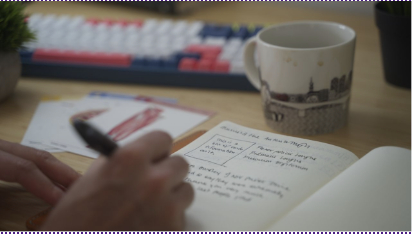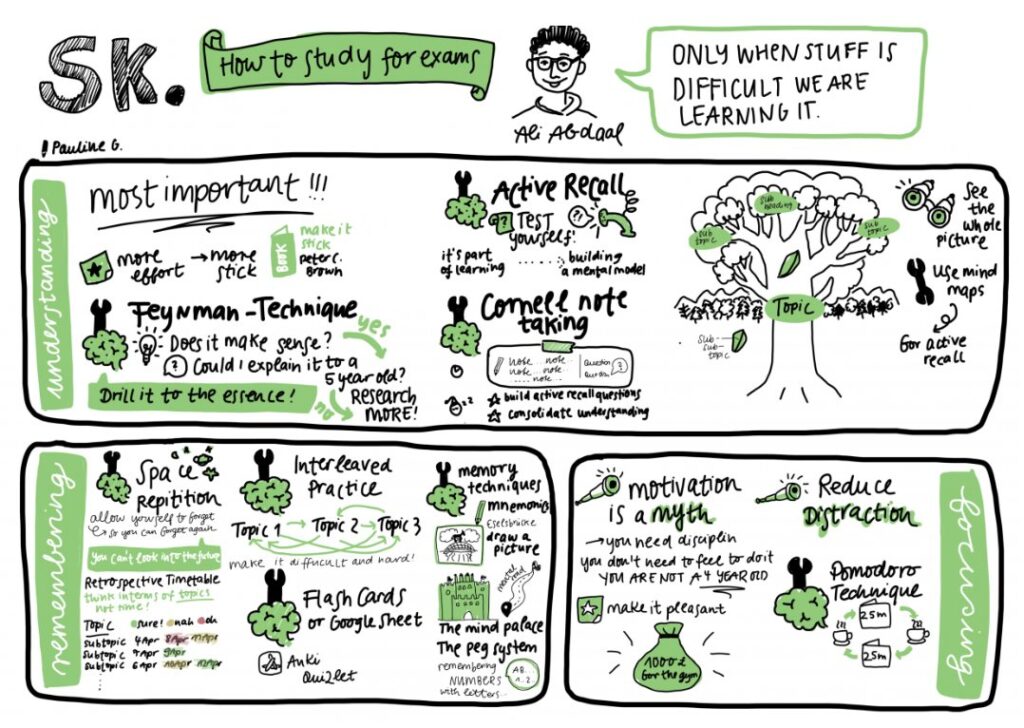Revision Strategy 溫習策略
Spaced Repetition 間歇重複溫習法
How to learn any language: SPACED REPETITION (2020)
2. Polyglot Lab: https://polyglotlab.herokuapp.com/
3. Glossika: https://loislin.com/glossika-jp
Best price for Glossika: https://loislin.com/glossika-jp
Best price for Lingq: https://loislin.com/lingq
Best price for JP101: https://loislin.com/jp101
How to Study for Exams (Episode 2) –
Spaced Repetition | Evidence-based revision tips
(溫馨提示:聰明人的說話速度極快,您可要非常專注才會跟得到他的分享!)
Today we’re continuing our series about how to study for exams with scientifically-proven techniques. This video is all about spaced repetition and how to apply it to your own study routine. We talk about some of the evidence behind it, and I share my own tips for how to build your spaced repetition spreadsheet. Enjoy!
PLEASE WATCH THIS VIDEO FIRST – [How to study for exams – Evidence-based revision tips – YouTube](https://www.youtube.com/watch?v=ukLnP…)
TIMESTAMPS:
01:05 – Introduction to spaced repetition
01:41 – The forgetting curve
04:40 – Spaced repetition within the same study session
06:41 – Structuring each day of study with spaced repetition in mind
08:37 – Tips for incorporating spaced repetition into your study routine
09:35 – Anki flashcards app
10:03 – Spaced repetition in everyday life
11:39 – Ali’s magical spaced repetition spreadsheet system.
12:40 – The importance of scoping your subject
16:17 – Tips for using the magical SR system
21:09 – Why I don’t like revision timetables
23:23 – Summary + closing remarks
LINKS:
1. [Improving Students’ Learning With Effective Learning Techniques: Promising Directions From Cognitive and Educational Psychology – John Dunlosky, Katherine A. Rawson, Elizabeth J. Marsh, Mitchell J. Nathan, Daniel T. Willingham, 2013](http://journals.sagepub.com/doi/abs/1…)
2. [Spaced retrieval: absolute spacing enhances learning regardless of relative spacing. – PubMed – NCBI](https://www.ncbi.nlm.nih.gov/pubmed/2…)
3. [Forgetting curve – Wikipedia](https://en.wikipedia.org/wiki/Forgett…)
4. [Anki – powerful, intelligent flashcards](https://apps.ankiweb.net)
Revision Schedule 溫習時間表
7科5**狀元的DSE一天:
如何盡用時間,計劃Study Leave時間表?
溫習時間實際要做啲乜?
How to Study for Exams – The STic Framework for Effective Learning
Hey team, in this video we’re talking about STic, a framework for studying / learning anything. We talk about Spacing, Testing, Interleaving and Categorising. If you can build your own study routines around these 4 principles, you’ll be unstoppable. Enjoy!
WATCH THESE OTHER STUDY-THEMED VIDEOS TOO
1. My most popular video introducing Active Recall – https://www.youtube.com/watch?v=ukLnP…
2. My 2nd most popular video about Spaced Repetition – https://www.youtube.com/watch?v=Z-zNH…
3. How to learn new content – https://www.youtube.com/watch?v=fBXnx…
4. The Retrospective Revision Timetable – https://www.youtube.com/watch?v=b7o09…
5. A playlist of my study tips videos – https://www.youtube.com/playlist?list…
Links
1. David Epstein on ‘Invest Like The Best – http://investorfieldguide.com/epstein/
2. David Epstein – The Sports Gene – https://geni.us/SRgj7Au
3. David Epstein – Range – https://geni.us/O9j7D8
4. McDaneil & Brown – Make it Stick – https://geni.us/MakeItStickBook
How to study for exams (Episode 1) –
Evidence-based revision tips
劍橋大學醫學系第一榮譽畢業生,教您怎樣預備考試:
Today we’re learning how to study for exams with scientifically-proven techniques. We start by talking about why rereading, highlighting and summarising are pretty inefficient, and then talk about the evidence behind Active Recall as the most efficient revision technique. We end with a few suggestions as to how to incorporate Active Recall into your study routine. Enjoy xx
TIMESTAMPS:
1. 01:29 – Popular but inefficient technique #1 – Rereading
2. 03:29 – Popular but inefficient technique #2 – Highlighting
3. 04:51 – Popular but inefficient technique #3 – Summarising
4. 06:42 – Active Recall, and the evidence behind why it’s the most effective revision strategy.
5. 09:18 – Study #1 – Spitzer 1939
6. 10:22 – Study #2 – Butler 2010
7. 11:16 – Study #3 – Karpicke & Blunt 2011
8. 13:41 – Specific, practical strategies for incorporating Active Recall into your revision / study routine.
9. 14:19 – Strategy #1 – Anki flashcards
10. 16:07 – Strategy #2 – Closed-book spider diagrams
11. 17:33 – Strategy #3 – Questions instead of notes, the Cornell note-taking system
12. 19:18 – Summary and closing remarks
LINKS:
If you’re actually interested in looking up these studies, the Dunlosky review paper (Link #1 below) is probably the best place to start. The references section there is full of useful links, all of which i cba to include in this video description 🙂
1. Dunlosky et al 2013 – [Improving Students’ Learning With Effective Learning Techniques: Promising Directions From Cognitive and Educational Psychology. – PubMed – NCBI](https://www.ncbi.nlm.nih.gov/pubmed/2…)
2. Karpicke 2016 – [A powerful way to improve learning and memory](http://www.apa.org/science/about/psa/…)
3. Spitzer 1939 – http://www.gwern.net/docs/spacedrepet…
4. Butler 2010 – http://sites.utexas.edu/mdl/files/201…
5. Karpicke & Blunt 2011 – [Retrieval Practice Produces More Learning than Elaborative Studying with Concept Mapping | Science](http://science.sciencemag.org/content…)
6. Anki – [Anki – powerful, intelligent flashcards](https://apps.ankiweb.net)
7. Make it Stick – http://geni.us/MakeItStickBook
8. Podcast episode with the author of ‘Make it Stick’ – https://www.artofmanliness.com/2018/0…
My Study Method + Revision Tools – Cambridge junior doctor
In this video, I talk through my general process for preparing for my next set of postgraduate medical exams, and discuss some of the tools that I’ll be using along the way. Enjoy!
This video is sponsored by Quizlet – https://quizlet.com #StudyWithQuizlet #StudyWithDoctorAli #ad
TIMESTAMPS
00:14 – Introduction to the Series
01:44 – The 2 principles of effective studying
03:12 – My study strategy
06:18 – Quizlet flashcards
08:17 – Google Sheets
09:48 – iPad Pro + Apple Pencil
10:41 – Exam questions
11:28 – Textbooks
Ali Abdaal’s Blog about Studying

【考前定心丸】DSE中文卷一閱讀:
拆解老是常出現的八種題型
【考前衝刺】DSE 英文口試 English Speaking :
一條片了解五大回應技巧 + 組織5**發言
6分鐘速食 | DSE Maths數學:
十個你要重温既Concept
呢條片就會教番大家一啲你可能唔記得左既Conept,尤其係低form教既課題 🙂
喜歡的話記得like同訂閱支持下我! 有任何意見或者指正歡迎係下面提出 🙂
———————————–
影片更正:
平行四邊形仲有prof by definition: 對邊都平行。
2:09:
a+b larger than c and
a+c larger than b and
b+c larger than a
【考前衝刺】DSE LS 通識:
有咩係大家一定要溫?
答題技巧以外的溫習方法 – 拆字、推論、例子
試前準備(考試當日) Preparation for the Exam Day
【考前定心丸】DSE中文口試:
考試流程 + 試前準備 + 當日須知
付費網上課程 Paid Online Course
Being able to study efficiently and effectively is a superpower. As students, it boost our grades, reduces our stress levels and frees up our time to do more interesting things. But we’re never taught how to do it. Most of us rely on ‘intuitive’ techniques like rereading, note-taking, summarising and highlighting to get through our exams. But as the evidence shows, these intuitive techniques are often counter-productive.
In this class, I’ll take you through the well-kept secrets of how to study effectively. We’ll break down (1) how to understand our content using techniques like the Feynman Method, Active Recall and various note-taking strategies, (2) how to remember our material with Spaced Repetition, Interleaving and various memory techniques, and (3) how to maintain focus while studying, from developing the motivation and discipline to do the work, to taking appropriate breaks and maintaining a healthy work-life balance.
I was a medical student at Cambridge University (UK) from 2012-2018. In my second year of medical school, I discovered the research around effective studying and memory enhancement, and it completely changed my life. By using the strategies you’ll learn in this class, I was able to start and grow a 6-figure business and later a successful YouTube channel while still getting pretty decent marks in my exams, and actually enjoying the whole process with a minimal level of stress.
Now that I’m a doctor working in the UK’s National Health Service (NHS), I still use these techniques when preparing teaching sessions for medical students, and when preparing for my own postgraduate medical exams. These days, my time is even more limited than it was when I was a student, but by using the appropriate study techniques, I can keep on top of the workload while still running my business, YouTube channel and having some semblance of a social life.
So thanks for stopping by – I hope you dive in and you can gain something from this class that you can apply to your own life.

Lesson Notes by the Student

